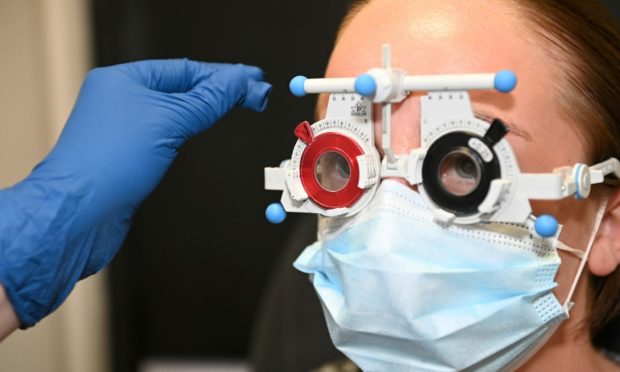A new study has laid bare the impact Covid has had on eye care across Scotland – with missed appointments now posing potential long-term sight damage.
Researchers from Aberdeen University examined the relationship between eye tests and follow-up referrals to a GP or hospital, which have been significantly disrupted by the pandemic.
The study, led by Professor Alexandros Zangelidis, personal chair in economics, built on previous research which identified the benefits of improved uptake of routine eye tests in detecting other health conditions, such as hyper tension.
Concerns about the impact of various health services as a result of the pandemic are mounting, with repeated complaints about the difficulty in securing an appointment with a GP.
And last week, the Scottish Government announced the army was being drafted in to help cut down on ambulance waiting times.
Optician practices reduce pressure on NHS
Restrictions have forced people to miss routine eye appointments, which has had a significant impact on referrals.
According to a recent report from the NHS Confederation, there have been 30% fewer new referrals to treatment in 2020 compared to 2019.
Findings from the university study highlight the critical role played by optometrists at high-street optician practices in reducing pressures on other parts of the NHS and how significantly this balance is tipped when those services are unavailable.
The research found that for curative pathways – where conditions are treated in high-street services – when 10% more examinations are conducted here, there is a 5% drop in referrals to GPs or hospitals.
Thousands of patients are waiting more than 12 weeks to get an appointment with eye specialists in hospitals.
In June across Grampian, 2,366 people were waiting more than three months to be seen – compared to 555 at the start of the pandemic.
Waiting times had previously been reducing since September 2019 but started to increase in March last year when services were reduced due to the coronavirus outbreak.
Across the Highlands in June, 737 people were forced to wait longer than 12 weeks to be seen for their first appointment. That’s compared to 89 people in waiting in March last year.
Charity Sight Scotland and Sight Scotland Veterans have been calling for action to be taken by health boards to ensure no patients has to wait longer than the target waiting time of 12 weeks.
Link between examinations and detection of other health conditions
The study also demonstrated the link between regular eye examinations and the detection of often asymptomatic conditions such as glaucoma, diabetes and hypertension.
Through analysis of the data, the Aberdeen researchers concluded that a 10% increase in supplementary eye examinations is associated with 8.6% more referrals to GP or hospital for early intervention measures.
Prof Zangelidis said: “When we can set out the benefits in this way, what we can also see are the negatives in reducing high-street optometry services through lock-down or other Covid-19 restrictions.
“Eye health conditions if left undetected and thus untreated, are expected to steadily deteriorate and lead to long-term damage to eye health and sight loss.
“The findings highlight the wider repercussions that temporary suspension of eye examinations and patients’ reluctance to have an eye examination during the pandemic may have on eye health.
“One of the specialities most affected has been ophthalmology, raising significant concerns about eye health of patients in the long-term and the impact of this on the detection of other conditions such as diabetes, which can be detected via routine eye examination.”
The team is now suggesting that more needs to be done to encourage a greater uptake in eye examinations – while warning any further pause on services due to Covid must be measured carefully against potential impact on peoples’ sight.
